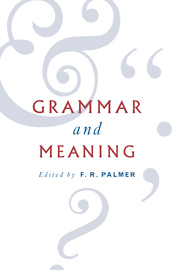Book contents
- Frontmatter
- Contents
- List of contributors
- Foreword
- 1 Polysemous relations
- 2 Fields, networks and vectors
- 3 Syntax, semantics, pragmatics
- 4 Natural-language interpretation as labelled natural deduction
- 5 Three levels of meaning
- 6 Does spoken language have sentences?
- 7 Grammaticalisation and social structure: non-standard conjunction-formation in East Anglian English
- 8 German Perfekt and Präteritum: speculations on meaning and interpretation
- 9 The possessed
- 10 Complement clauses and complementation strategies
- 11 Grammar and meaning
- John Lyons: publications
- Index
1 - Polysemous relations
Published online by Cambridge University Press: 30 January 2010
- Frontmatter
- Contents
- List of contributors
- Foreword
- 1 Polysemous relations
- 2 Fields, networks and vectors
- 3 Syntax, semantics, pragmatics
- 4 Natural-language interpretation as labelled natural deduction
- 5 Three levels of meaning
- 6 Does spoken language have sentences?
- 7 Grammaticalisation and social structure: non-standard conjunction-formation in East Anglian English
- 8 German Perfekt and Präteritum: speculations on meaning and interpretation
- 9 The possessed
- 10 Complement clauses and complementation strategies
- 11 Grammar and meaning
- John Lyons: publications
- Index
Summary
Introduction
In the section of Lyons' Semantics that deals with the distinction between homonymy and polysemy, he notes that a major criterion ‘is unrelatedness vs. relatedness of meaning … indeed, it is arguable that it is the only synchronically relevant consideration’ (1977: 551). However, he goes on to argue that all attempts ‘to explicate the notion of relatedness of meaning in terms of a componential analysis of the senses of lexemes … have so far failed’ (1977: 552–3). Although Lyons is sympathetic to a treatment of the lexicon that seeks to maximise polysemy at the expense of homonymy, he does not himself go on in that book to reconstruct the notion of relatedness of meaning that such a treatment requires.
Discussing polysemy some nine years earlier, Lyons was a little more explicit about what might be required: ‘Various … types of “extension” or “transference” of meaning were recognized by the Greek grammarians, and have passed into traditional works on rhetoric, logic, and semantics. Meanings that are more or less closely “related” in accordance with such principles are not traditionally regarded as being sufficiently different to justify the recognition of distinct words’ (1968: 406). Metaphorical extension is the only kind of extension explicitly discussed in connection with polysemy in Introduction to Theoretical Linguistics although it is clear from the quotation just given that it was not the only one that Lyons had in mind.
Information
- Type
- Chapter
- Information
- Grammar and MeaningEssays in Honour of Sir John Lyons, pp. 1 - 25Publisher: Cambridge University PressPrint publication year: 1995
Accessibility standard: Unknown
Why this information is here
This section outlines the accessibility features of this content - including support for screen readers, full keyboard navigation and high-contrast display options. This may not be relevant for you.Accessibility Information
- 1
- Cited by
